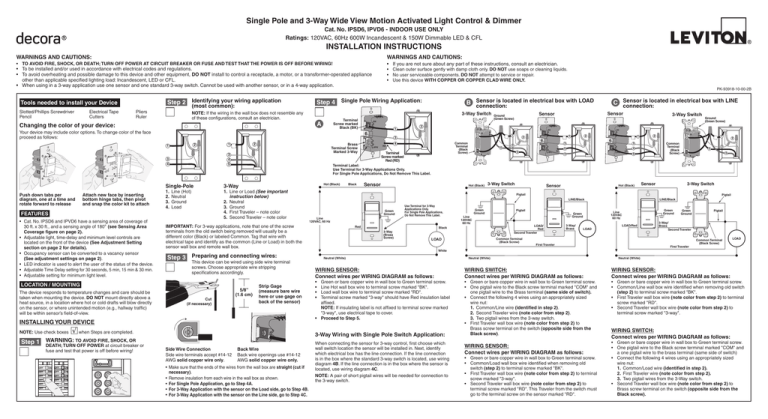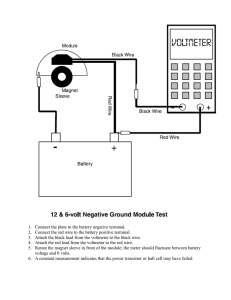
Single Pole and 3-Way Wide View Motion Activated Light Control & Dimmer
Cat. No. IPSD6, IPVD6 - INDOOR USE ONLY
Ratings: 120VAC, 60Hz 600W Incandescent & 150W Dimmable LED & CFL
INSTALLATION INSTRUCTIONS
WARNINGS AND CAUTIONS:
WARNINGS AND CAUTIONS:
• TO AVOID FIRE, SHOCK, OR DEATH; TURN OFF POWER AT CIRCUIT BREAKER OR FUSE AND TEST THAT THE POWER IS OFF BEFORE WIRING!
• If you are not sure about any part of these instructions, consult an electrician.
• Clean outer surface gently with damp cloth only. DO NOT use soaps or cleaning liquids.
• No user serviceable components. DO NOT attempt to service or repair.
• T
o be installed and/or used in accordance with electrical codes and regulations.
• To avoid overheating and possible damage to this device and other equipment, DO NOT install to control a receptacle, a motor, or a transformer-operated appliance
other than applicable specified lighting load: Incandescent, LED or CFL.
• When using in a 3-way application use one sensor and one standard 3-way switch. Cannot be used with another sensor, or in a 4-way application.
Step 2 Identifying your wiring application
Tools needed to install your Device
Slotted/Phillips Screwdriver
Pencil
Electrical Tape
Cutters
(most common):
Pliers
Ruler
NOTE: If the wiring in the wall box does not resemble any
of these configurations, consult an electrician.
Changing the color of your device:
1
TEST
T EST
0
ET
RES
3
1
R ESET
0
2
1
3
0
2
0
2
2
Terminal
Screw marked
Black (BK)
A
2
1
Brass
Terminal Screw
Marked 3-Way
3
4
1. Line (Hot)
2. Neutral
3. Ground
4. Load
FEATURES
• Cat. No. IPSD6 and IPVD6 have a sensing area of coverage of
30 ft. x 30 ft., and a sensing angle of 180O (see Sensing Area
Coverage figure on page 2).
• Adjustable light, time-delay and minimum level controls are
located on the front of the device (See Adjustment Setting
section on page 2 for details).
• Occupancy sensor can be converted to a vacancy sensor (See adjustment settings on page 2).
• LED indicator is used to alert the user of the status of the device.
• Adjustable Time Delay setting for 30 seconds, 5 min, 15 min & 30 min.
• Adjustable setting for minimum light level.
Hot (Black)
3-Way
1.
Line or Load (See important
instruction below)
2. Neutral
3. Ground
4. First Traveler – note color
5. Second Traveler – note color
This device can be wired using side wire terminal
screws. Choose appropriate wire stripping
specifications accordingly.
Cut
(if necessary)
5/8”
(1.6 cm)
Strip Gage
(measure bare wire
here or use gage on
back of the sensor)
√
NOTE: Use check boxes when
Steps are completed.
ON
OFF
ON
OFF
ON
OFF
ON
OFF
ON
OFF
ON
OFF
ON
OFF
ON
OFF
ON
OFF
ON
OFF
ON
OFF
ON
Side Wire Connection
Side wire terminals accept #14-12
AWG solid copper wire only.
Ground
(Green Screw)
2
BK
BK
1
Common
Terminal
(Black
Screw)
4
Terminal
Screw marked
Red (RD)
Black
Sensor
4
2
1
2
1
3
3
5
Hot (Black)
Green
Ground
Line
120VAC, 60 Hz
Use Terminal for 3-Way
Applications Only.
For Single Pole Applications,
Do Not Remove This Label.
Red
3-Way
Back Wire
Back wire openings use #14-12
AWG solid copper wire only.
• Make sure that the ends of the wires from the wall box are straight
(cut if
RD
YL 3-Way
necessary).
• Remove insulation from each wire in the wall box as shown.
• For Single Pole Application, go to Step 4A.
• For 3-Way Application with the sensor on the Load side, go to Step 4B.
• For 3-Way Application with the sensor on the Line side, go to Step 4C.
3-Way Switch
Green
Ground
Line
120VAC
60 Hz
Black
3-Way
(Brass
Screw)
LOAD
RD
2
4
5
3-Way
4
RD
1
Common
Terminal
(Black
Screw)
3
5
2
3
5
4
Sensor
Hot (Black)
3-Way Switch
Sensor
Pigtail
Pigtail
Common Terminal
(Black Screw)
3-Way/
Brass
Green
Ground
Line
120VAC
60 Hz
Green
Ground
LOAD/
Red
Second Traveler
LINE/Black
LOAD
LOAD/Red
First Traveler
Green
Ground
Pigtail
3-Way/
Brass
Second Traveler
First Traveler
Common Terminal
(Black Screw)
LOAD
White
Neutral (White)
WIRING SENSOR:
Connect wires per WIRING DIAGRAM as follows:
•
•
•
•
Green or bare copper wire in wall box to Green terminal screw.
Line Hot wall box wire to terminal screw marked "BK".
Load wall box wire to terminal screw marked "RD".
T
erminal screw marked "3-way" should have Red insulation label
affixed.
NOTE: If insulating label is not affixed to terminal screw marked
"3-way", use electrical tape to cover.
• Proceed to Step 5.
3-Way Wiring with Single Pole Switch Application:
Step 1 WARNING: TO AVOID FIRE, SHOCK, OR
OFF
3-Way
RD
3-Way Switch
LINE/Black
Step 3 Preparing and connecting wires:
INSTALLING YOUR DEVICE
DEATH; TURN OFF POWER at circuit breaker or
fuse and test that power is off before wiring!
1
Ground
(Green Screw)
connection:
Sensor
Sensor
Pigtail
IMPORTANT: For 3-way applications, note that one of the screw
terminals from the old switch being removed will usually be a
different color (Black) or labeled Common. Tag that wire with
electrical tape and identify as the common (Line or Load) in both the
sensor wall box and remote wall box.
LOCATION / MOUNTING
The device responds to temperature changes and care should be
taken when mounting the device. DO NOT mount directly above a
heat source, in a location where hot or cold drafts will blow directly
on the sensor, or where unintended motion (e.g., hallway traffic)
will be within sensor’s field-of-view.
BK
C Sensor is located in electrical box with LINE
Terminal Label:
Use Terminal for 3-Way Applications Only.
For Single Pole Applications, Do Not Remove This Label.
3
3
Attach new face by inserting
bottom hinge tabs, then pivot
and snap the color kit to attach
connection:
3-Way Switch
3
4
5
Single-Pole
Push down tabs per
diagram, one at a time and
rotate forward to release
B Sensor is located in electrical box with LOAD
3
1
1
PK-93918-10-00-2B
Step 4 Single Pole Wiring Application:
Your device may include color options. To change color of the face
proceed as follows:
2
• Use this device WITH COPPER OR COPPER CLAD WIRE ONLY.
When connecting the sensor for 3-way control, first choose which
wall switch location the sensor will be installed in. Next, identify
which electrical box has the line connection. If the line connection
is in the box where the standard 3-way switch is located, use wiring
diagram 4B. If the line connection is in the box where the sensor is
located, use wiring diagram 4C.
NOTE: A pair of short pigtail wires will be needed for connection to
the 3-way switch.
Neutral (White)
WIRING SWITCH:
Connect wires per WIRING DIAGRAM as follows:
• Green or bare copper wire in wall box to Green terminal screw.
• One pigtail wire to the Black screw terminal marked "COM" and
one pigtail wire to the Brass terminal (same side of switch).
• Connect the following 4 wires using an appropriately sized wire nut:
1. Common/Line wire (identified in step 2).
2. Second Traveler wire (note color from step 2).
3. Two pigtail wires from the 3-way switch.
• First Traveler wall box wire (note color from step 2) to Brass screw terminal on the switch (opposite side from the
Black screw).
WIRING SENSOR:
Connect wires per WIRING DIAGRAM as follows:
• Green or bare copper wire in wall box to Green terminal screw.
• Common/Load wall box wire identified when removing old
switch (step 2) to terminal screw marked "BK".
• First Traveler wall box wire (note color from step 2) to terminal
screw marked "3-way".
• Second Traveler wall box wire (note color from step 2) to
terminal screw marked "RD". This Traveler from the switch must
go to the terminal screw on the sensor marked "RD".
Neutral (White)
WIRING SENSOR:
Connect wires per WIRING DIAGRAM as follows:
• Green or bare copper wire in wall box to Green terminal screw.
• Common/Line wall box wire identified when removing old switch
(step 2) to terminal screw marked "BK".
• First Traveler wall box wire (note color from step 2) to terminal
screw marked "RD".
• Second Traveler wall box wire (note color from step 2) to
terminal screw marked "3-way".
WIRING SWITCH:
Connect wires per WIRING DIAGRAM as follows:
• Green or bare copper wire in wall box to Green terminal screw.
• One pigtail wire to the Black screw terminal marked "COM" and
a one pigtail wire to the brass terminal (same side of switch)
• Connect the following 4 wires using an appropriately sized wire nut:
1. Common/Load wire (identified in step 2).
2. First Traveler wire (note color from step 2).
3. Two pigtail wires from the 3-Way switch.
• Second Traveler wall box wire (note color from step 2) to Brass screw terminal on the switch (opposite side from the
Black screw).
Step 5 Testing your Device prior to mounting in
wall box:
NOTE: Dress wires with a bend as
shown in diagram in order to relieve
stress when mounting device.
• P
osition all wires to provide room in outlet wall box for device.
• E
nsure that the word "TOP" is facing up on device strap.
• P
artially screw in mounting screws in wall box mounting holes.
• Restore power at circuit breaker or fuse.
• For IPSD6 lights will automatically turn ON
after power is applied.
• For IPVD6, press and release pushpad to
turn the lights ON.
See Locator Light Status chart to
confirm the operational state of the
device.
If lights still do not turn ON, refer to the
TROUBLESHOOTING section.
Step 6
Device Mounting:
TURN OFF POWER AT CIRCUIT BREAKER OR
FUSE.
OPERATION
ADJUSTMENT SETTINGS
IPSD6: Auto On
Lights will automatically turn on when room is occupied or motion is
detected. The IPSD6 will switch lights off when no motion is detected
in un-occupied room after a set period of time.
Time delay adjustment: refer to section on Adjustment settings.
The ON/OFF/DIM push pad can be used to manually turn the
lighting load ON and OFF or to dim it UP and DOWN.
Dimming: Once the load has been turned ON, push and hold the
ON/OFF/DIM button to dim the lights UP or DOWN. To reverse the
dimming direction momentarily release the ON/OFF/DIM button, then
push and hold it again. Once you achieve the desired light level the
dimmer will re-call the pre-set dimming level when turning on the load.
Light level adjustment: Refer to section on adjustment settings.
IPVD6: Manual On
Operation requires the user to manually turn the lights ON by
depressing the ON/OFF/DIM pad. Lights will automatically turn OFF
when the room is left un-occupied for a set period of time.
Time Delay Adjustment: Refer to section on Adjustment settings.
Dimming: Once the load has been turned ON, push and hold the
ON/OFF/DIM button to dim the lights UP or DOWN. To reverse the
dimming direction momentarily release the ON/OFF/DIM button, then
push and hold it again. Once you achieve the desired light level the
dimmer will re-call the pre-set dimming level when turning on the load.
NOTE: In a 3-way application, the 3-way switch provides the ability
to manually switch the load ON from a second location. The sensor
will time out and switch the load OFF once motion is no longer
detected and the time delay expires.
Locator Light LED:
IPSD6: LED blinks when motion is detected.
Enabling Kick Start
1. Pull the push pad out from the bottom (to activate the air gap switch).
2. Push the push pad gently back into place until the button is pushed too.
3. Keep the button pushed for ten seconds.
4. Device will blink the locator led to indicate successful programming.
a. CFL mode (kick start):
2 blink
b. LED/Incandescent mode: 1 blink
Locator
Light
Push
Pad
LOAD
IPSD6
IPVD6
OFF
Blinking
Lit
ON
Blinking
Blinking
30ft
9.1m
5ft
1.5m
Time Selection
1
2
0
3
1
2
1
0
3
0
Minimum Level
Dimming Adjustment
2
3
6ft
1.8m
5ft
1.5m
6ft
1.7m
30ft
9.1m
Minimum Dim Level Adjustment:
• Turn the control clockwise. Lights will dim to higher light level.
• Turn the control counter clockwise. Lights will dim to lower light
level.
2. Test that the light level, time selection and minimum dimming level
are set as desired. If not, repeat adjustments until satisfied.
IPVD6: LED blinks when motion is detected and load is ON.
LED will remain illuminated when load is OFF.
LOCATOR LIGHT STATUS
Step 7 Restore Power: Restore power at circuit breaker
Time Selection:
• Adjust the time selector to the desired length of time the lights
are to remain ON. Lights will remain ON from 30 seconds to 30
minutes after the room is vacated.
• Turn the control clockwise. Lights will remain ON up to 30
minutes (see table below).
• Turn the control counter-clockwise. Lights will remain ON up to
30 seconds (see table below).
CFL & LED dimming: The dimmer features a user adjustable dial
for setting the minimum light level. This feature can be used with
certain lighting loads to reduce any flicker at low light levels.
TROUBLESHOOTING
Field-of-View (Horizontal)
Light Level Adjustment:
• Turn the control clockwise. Lights will turn ON in lighter
conditions.
• Turn the control counter-clockwise. Lights will turn ON in less
lighting conditions.
• Adjusting light level fully counter clockwise will require manual
operation of the sensor.
3. Mount wallplate. INSTALLATION IS COMPLETE.
Lens
Installation may now be completed by tightening mounting screws
into wall box. Attach wallplate.
SENSING AREA COVERAGE
1. With power restored and wallplate removed, remove face of
device to expose setting controls, see color change instructions in
page 1. Use your finger or a small screwdriver to adjust the light
sensitivity and time settings on the device as follows:
Side (Vertical) Field-of-View
8ft
2.6m
27ft
8.4m
6ft
1.7m
7ft
2.1m
4ft
1.2m
5ft
1.5m
Light Level
Adjustment
4ft
1.4m
30ft
9.1m
REPLACING LAMPS
Time Settings
Time
0
30 Sec
1
5 Min
2
15 Min
3
30Min
NOTE: To operate the IPSD6 as a vacancy sensor (manual ON/Auto
OFF) - rotate the light level adjustment fully counter clockwise.
The IPSD6 and the IPVD6 utilizes an Air Gap Isolation feature when
replacing a lamp(s) connected to the IPSD6 or the IPVD6, for safety.
1. Pull the bottom of the push pad out as shown in the Figure A
until it locks into place. This engages the Air Gap, which stops
electricity from flowing to the connected load.
2. After replacing the lamp(s), press the Air Gap Switch (push pad)
so that it returns to the original position ensuring it is flush with
the surface of the Sensor/Dimmer (Figure B).
3. The Sensor/Dimmer will return to its pre-set condition and is
ready to operate.
A)
B)
or fuse.
Installation is complete.
© 2012 Leviton Mfg. Co., Inc.
Engage Air Gap
Reset Sensor/Dimmer
Lights do not switch ON - IPSD6:
• Motion is beyond sensing range, move closer to switch.
• Adjust the light level adjustment toward lighter or darker,
depending on room conditions.
Lights always stay ON:
• Check time delay settings and compare to how long the lights
stay ON.
• Be sure that no motion occurs in coverage area for time
selected.
• Check that switch is not installed near a heat source (e.g., stove, lights, heat vents) or detecting motion from an
adjacent area (e.g., hallway traffic). If so, switch may have to be relocated.
Lights do not turn ON - IPVD6:
• Check that switch is installed correctly.
• Check that power is ON.
• Check that light bulb is functioning.
The LED or CFL bulb flickers or flashes during start up:
• Verify the bulb is marked "dimmable" This device is intended to
operate only dimmable LED and CFL bulbs.
Flickering is observed at low dim level:
• Some LED and CFL bulbs do not achieve the same minimum
light level of incandescent. Refer to section on adjusting the
minimum brightness setting for LED and CFL bulbs.
CFL bulb appears to flicker:
• CFL bulbs may require several minutes of warm up to stabilize
the light.
LED or CFL bulbs do not turn on:
• Refer to section on enabling kick start feature for CFL and LED
lamps.
NOTE: If problems continue, consult an electrician.
For additional information, contact Leviton’s Techline at
1-800-824-3005 or visit Leviton’s website at www.leviton.com
This product is covered by U.S. Pat. No. 7,924,155
and corresponding foreign patents.
© 2012 Leviton Manufacturing Co., Inc.
All Rights Including Trade Dress Rights Reserved
FCC COMPLIANCE STATEMENT
This device complies with Part 15 of the FCC Rules. Operation is subject to
following two conditions: (1) this device may not cause harmful interference,
and (2) this device must accept any interference received, including
interference that may cause undesired operation of the device.
This equipment has been tested and found to comply with the limits for a
Class B Digital Device, pursuant to Part 15 of the FCC Rules. These limits
are designed to provide reasonable protection against harmful interference
in a residential installation. This equipment generates, uses, and can radiate
radio frequency energy and, if not installed and used in accordance with
the instructions, may cause harmful interference to radio communications.
However, there is no guarantee that interference will not occur in a particular
installation. If this equipment does cause harmful interference to radio or
television reception, which can be determined by turning the equipment OFF
and ON, the user is encouraged to try to correct the interference by one or
more of the following measures:
• Reorient or relocate the receiving Antenna.
• Increase the separation between the equipment and the receiver.
• Connect the equipment into an outlet on a circuit different from that to
which the receiver is connected.
• Consult the dealer or an experienced radio/tv technician for help.
FCC CAUTION
Any changes or modifications not expressly approved by Leviton
Manufacturing Co., Inc., could void the user's authority to operate the
equipment.
PK-93918-10-00-2B
LIMITED 5 YEAR WARRANTY AND EXCLUSIONS
Leviton warrants to the original consumer purchaser and not for the benefit of anyone else that this product at the time of its sale by Leviton is free of defects in materials and workmanship under normal and proper use for five years from the purchase date. Leviton’s only obligation is to correct such defects by repair or replacement, at its option, if within such five year period the product is returned prepaid, with
proof of purchase date, and a description of the problem to Leviton Manufacturing Co., Inc., Att: Quality Assurance Department, 201 North Service Road, Melville, New York 11747. This warranty excludes and there is disclaimed liability for labor for removal of this product or reinstallation. This warranty is void if this product is installed improperly or in an improper environment, overloaded, misused, opened,
abused, or altered in any manner, or is not used under normal operating conditions or not in accordance with any labels or instructions. There are no other or implied warranties of any kind, including merchantability and fitness for a particular purpose, but if any implied warranty is required by the applicable jurisdiction, the duration of any such implied warranty, including merchantability and fitness for
a particular purpose, is limited to five years. Leviton is not liable for incidental, indirect, special, or consequential damages, including without limitation, damage to, or loss of use of, any equipment, lost sales or profits or delay or failure to perform this warranty obligation. The remedies provided herein are the exclusive remedies under this warranty, whether based on contract, tort or otherwise.



